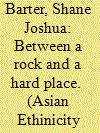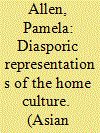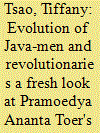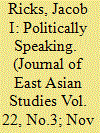|
|
|
Sort Order |
|
|
|
Items / Page
|
|
|
|
|
|
|
| Srl | Item |
| 1 |
ID:
137219


|
|
|
|
|
| Summary/Abstract |
Secessionist movements are often motivated by a sense of exclusion, abuse, and assimilation at the hands of host states. But in waging armed struggles and constructing ethnic nationalisms, they may replicate such grievances against their own minorities. This paper seeks to provide a deeper understanding of how ‘second-order minorities’ respond to secessionist ethno-nationalism. Based on ethnographic research in Aceh, Indonesia, this paper looks to how Javanese, Malay, Alas, and Gayo communities responded to Acehnese secessionism. Aceh’s minorities did not support Aceh’s rebels, opting to flee or resist rebellion. In explaining their reaction, I suggest that the same ethno-nationalist project which united many Acehnese in the secessionist struggle served to repel non-Acehnese communities, leading to ethno-nationalist revivals among Aceh’s minorities and continued tensions in the post-conflict era.
|
|
|
|
|
|
|
|
|
|
|
|
|
|
|
|
| 2 |
ID:
139457


|
|
|
|
|
| Summary/Abstract |
The focus of this paper is the ways in which certain customs and traditions are actively selected and/or reinvigorated and subsequently authorised, by institutions or by individuals, as being key markers of the culture of the ‘homeland’. The cultural practices chosen for discussion are the kejawen mystical system as practised in Suriname and the acquisition of the Indonesian national language, bahasa Indonesia, in New Caledonia. The discussion is informed by two key ideas. The first is that immigrant communities designate certain cultural practices as being worthy of preservation as an ‘inheritance’ for the future. The second is the interplay between cultural practices and power or authority, which gels in scholarly discussions about ‘cultural heritage’. I argue that the continuation of a cultural practice or tradition lies as much with its authorisation by key individuals or institutions as it does with its purported authenticity.
|
|
|
|
|
|
|
|
|
|
|
|
|
|
|
|
| 3 |
ID:
157949


|
|
|
|
|
| Summary/Abstract |
This study attempts to provide a portrayal of emotional intelligence (EI) of the Indonesians, one of the fourth most populous countries and multiethnic societies in the world, specifically across the 404 Bataks, 430 Minangkabau, and 479 Javanese ethnics. The result indicated that the Indonesian version of the EQ-i is invariant across the three ethnic groups. The findings also showed that the three ethnic groups have some shared characteristics in terms of interpersonal, assertiveness, empathy, social responsibility, flexibility, and problem-solving competences. We found significant main effects of ethnicity and gender as well as the interaction effect on EI competences. Cross-ethnic comparison showed that the Minangkabau assessed in this study are the most underdeveloped group in terms of social and emotional capabilities. We recommend replications of this study for other Indonesian ethnic groups to draw a more valid conclusion and to support the development of society.
|
|
|
|
|
|
|
|
|
|
|
|
|
|
|
|
| 4 |
ID:
111522


|
|
|
|
|
| Publication |
2012.
|
| Summary/Abstract |
This article undertakes an in-depth exploration of the trope of human evolutionary development undergirding Pramoedya Ananta Toer's Buru Quartet - a trope that has hitherto received no detailed critical attention in Pramoedya scholarship. Drawing on the traditional Javanese values of Pramoedya's childhood and the Marxist ideological values of his early adulthood, the Quartet casts the individual's moral development from selfish individualism to selfless community-mindedness as the development from animalism to 'modern humanity'. In the context of traditional Javanese and Marxist cosmologies, such self-denial ends in victory: respectively, the accumulation of personal power and the successful revolutionary replacement of capitalism with socialism. However, during his brutal imprisonment in the Darwinian wilderness of Buru, Pramoedya experienced an environment that rewarded animalism and made it difficult for those ascribing to 'human' values to survive. Originally composed in Buru, the Quartet bears the mark of its origins and its author's disillusionment, portraying the attainment of Javanese and Marxist standards of humanity as a decision to defy the laws of natural selection and overcome one's instinct for self-preservation. By dissociating the acquisition of humanity from the acquisition of power, the Quartet produces modified versions of the Javanese and Marxist moral human development based not on the expectation of success and the will to live, but on the expectation of failure and the determination to die.
|
|
|
|
|
|
|
|
|
|
|
|
|
|
|
|
| 5 |
ID:
189047


|
|
|
|
|
| Summary/Abstract |
Language is one of the quintessential markers of ethnicity. It allows co-ethnics to easily identify one another and underscores in-group and out-group boundaries. Recognizing this, politicians frequently employ ethnic tongues to enhance their political appeal. To what extent does this shape the opinions of their audiences? Utilizing a survey experiment, I test the impact of an ethnic tongue against that of the common political language among the Javanese in Indonesia, the Tagalog in the Philippines, and the Isan people in Thailand. The experiment demonstrates that the ethnic language has a significant impact in both Thailand and Indonesia, but there appears to be little effect of using Tagalog over Filipino English in the Philippines. The findings suggest that ethnic tongues have the potential to significantly enhance political appeals, both among dominant (Javanese) and marginal (Isan) ethnic groups, but when the ethnic group is already the linguistic hegemon (Tagalog), such effects may be limited.
|
|
|
|
|
|
|
|
|
|
|
|
|
|
|
|
|
|
|
|
|